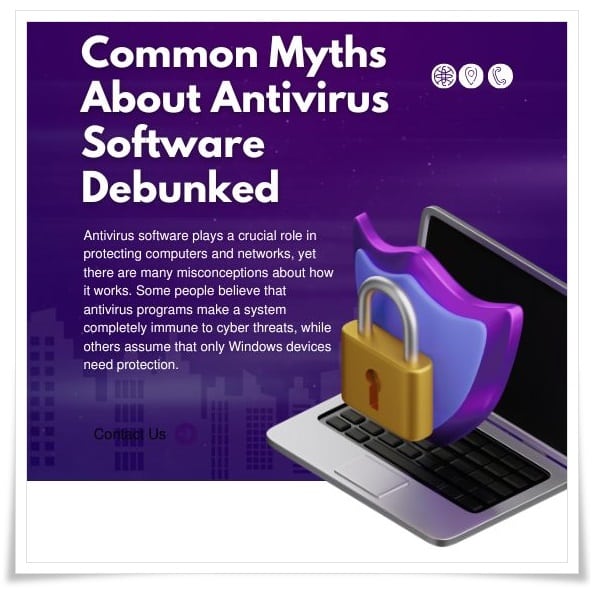
Antivirus software plays a crucial role in protecting computers and networks, yet there are many misconceptions about how it works. Some people believe that antivirus programs make a system completely immune to cyber threats, while others assume that only Windows devices need protection. These misunderstandings can lead to poor cybersecurity decisions, leaving users vulnerable to attacks. By separating fact from fiction, individuals and businesses can make informed choices about their digital security. This article debunks some of the most common myths surrounding antivirus software and explains why relying solely on these misconceptions can be dangerous.
Myth 1: Macs Don’t Need Antivirus Protection
One of the most widespread myths is that Apple devices are immune to malware. While macOS has built-in security features, it is not invincible. Cybercriminals continue to develop sophisticated threats targeting Apple users, including phishing attacks, ransomware, and Trojans. Many Mac users fail to install antivirus software, believing they are safe by default, which makes them an easy target. The reality is that all operating systems have vulnerabilities, and no device is completely secure. Investing in a reliable antivirus solution ensures better protection against emerging threats, regardless of whether you’re using Windows, macOS, or Linux.
Myth 2: Free Antivirus is Just as Good as Paid Versions
While free antivirus programs offer basic protection, they often lack the advanced security features that paid versions provide. Many premium antivirus solutions include real-time threat detection, firewall protection, and ransomware defenses. Free versions may also come with intrusive ads or limited updates, leaving users exposed to newer threats. Businesses, in particular, require comprehensive security measures that go beyond what a free program can offer. Cybersecurity is an investment, not an expense, and choosing a paid antivirus program can make a significant difference in protecting sensitive data and systems from modern cyber threats.
Myth 3: Antivirus Software Slows Down Your Computer
Many users believe that installing an antivirus program will drastically reduce their computer’s speed. While older antivirus solutions were known to be resource-heavy, modern security software is designed to be lightweight and efficient. The impact on performance largely depends on how well the software is optimized. Security developers ensure that antivirus solutions run smoothly by integrating them with operating systems and third-party applications. Well-documented API documentation plays an essential role in that, as it allows developers to create antivirus tools that function seamlessly without compromising performance. Proper integration ensures that users get robust security without system slowdowns.
Myth 4: You Don’t Need Antivirus If You’re Careful Online
Some believe that practicing safe browsing habits eliminates the need for antivirus protection. While avoiding suspicious links and downloads is important, cybercriminals use increasingly sophisticated tactics to exploit even cautious users. Phishing scams, malicious ads, and hidden malware in legitimate-looking websites can infect a system without any obvious warning signs. Antivirus software acts as a safety net, detecting and blocking threats that might go unnoticed. Even the most tech-savvy users can fall victim to cyberattacks, which makes it essential to have multiple layers of protection, including up-to-date antivirus software and a strong cybersecurity strategy.
Myth 5: Once Installed, Antivirus Works Forever
Another misconception is that antivirus software is a one-time solution that doesn’t require maintenance. In reality, threats evolve constantly, and security programs must be updated regularly to stay effective. New malware variants emerge daily, requiring antivirus databases to be refreshed frequently. Users who neglect updates risk running outdated software that may not detect newer threats. Additionally, security settings should be reviewed periodically to ensure optimal protection. Cybersecurity is an ongoing process, and staying proactive with updates and system checks ensures that antivirus software remains an effective defense against cyber threats.
Leave a Reply
You must be logged in to post a comment.